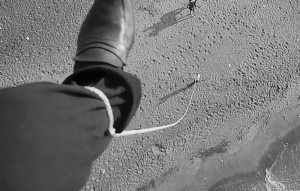While the plot of this film is clearly pretty confusing… I love when I see a movie that has clearly influenced generations of subsequent filmmakers. Fellini’s second great master piece, (the other being La Dolce Vita), is pretty brilliant when you can get past the shaky plot structure and just take it is the moving painting, dream logic filled existential crisis that it really is.
I love how this is the plot description on wikipedia: “Guido Anselmi (Marcello Mastroianni), a famous Italian film director, is suffering from “director’s block“. Stalled on his new science fiction film that includes veiled autobiographical references, he has lost interest amid artistic and marital difficulties. As Guido struggles half-heartedly to work on the film, a series of flashbacks and dreams delve into his memories and fantasies; they are frequently interwoven with reality.”
Firstly, I though the cinematography and shot style was as interesting and perfect as you can ask for. The first shot in the tunnel followed by the man floating above the beach were not only advanced for their time, but also hauntingly beautiful. Inception’s director Christopher Nolan clearly felt a similar reaction since his subconscious creatures that inhabit our minds also feel the need to stare at the trapped subject. That’s one already.
Next, let’s look at Mastroianni’s character. Guido Anselmi, a famous film director played brilliantly by Mastroainni, is like the actual Italian Don Draper of the 60s… Weiner did say that he based a lot of his 60s base Ad show on the Fellini film. But now that I have seen it, I totally see why. Like Draper, Guido is heralded as a brilliant man, but he has reached his limit in a sense. Mad Men is the American prequel to 8 1/2 (and perhaps will end similarly to 8 1/2). But Guido has hit the end of the road and is now finally reflecting on his life through his own personal lens (that of his mind, through his memories and dreams). That’s a difficult thing to face when you have lived your entire professional life through the cinematic apparatus creating falsified dream pictures and spent your entire childhood being challenged by the Catholic church.
The style of the film is undeniably attractive. Not only the costuming and beauty of the leading characters, but the city spots they go to are also gorgeous, the beaches, the flashbacks… They all have a beauty to them that is ineffable. Also, the subtle psychological hints he gives us in the dream scenes delivers us the proper bits of info needed to understand why he looks at women the way he does. I though the dream with his parents was particularly telling as he literally kisses his mom in Oedipus fashion until she turns into his wife and buries his Dad. His existential crisis doesn’t have a sense of Hollywood urgency. The pacing is slow deliberately and the timing of events is disjointed. There is no reason why we should care about this man. But, we do. This film is an undeniable masterpiece for what it does with it’s images. I could watch this film on silent and still get the same effect.
And now… Some influence that the film has had
Beyond Burton and Taratino, you have Nolan, David Lynch, Charlie Kaufman, and even Scorsese who clearly feel a connection to the film via their disjointed narratives, psychologically troubled protagonists and dream logic.
In Fellini’s mind… sometimes you feel like your floating, and just want to let go. If we’re to take the film as a book end, then he really did end his life and was heralded into Heaven as if it were an orchestrated circus… just like life

